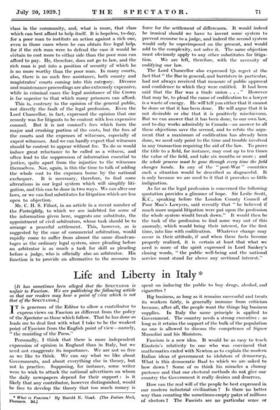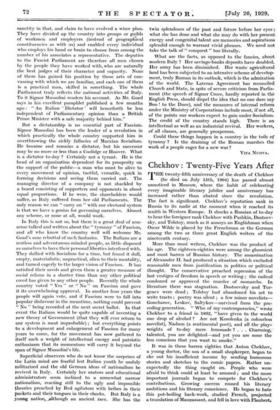Life and Liberty in Italy *
[It has sometimes been alleged that the SPECTATOR is unfair to Fascism. We are publishing the following article so that our readers may hear a point of view which is not that of the SPECTATOR.] IT is generous of the Editor to allow a contributor to -I- express views on Fascism as different from the policy of the Spectator as these which follow. That he has done so leads me to deal first with what I take to be the weakest point of Fascism from the English point of view—namely, " the muzzling of the Press."
Personally, I •think that there is more independent expression of opinion in England than in Italy, but we need not exaggerate its importance. We are not so free as we like to think. We can say what we like about Governments, and about everything else in theory, but not in practice. Supposing, for instance, some writer were to wish to attack the national advertisers on whom the daily newspapers depend for their support : is it likely that any contributor, however distinguished, would be free to develop the theory that too much money is * What is Fascism? By Harold E. Goad. (The Italian Mail, Florence. 3d.) spent on inducing the public to buy drugs, alcohol, and cigarettes ?
Big business, as long as it remains successful and treats its workers fairly, is generally immune from criticism because, after all, the people want the things big business supplies. In Italy the same principle is applied to Government. The country needs a strong executive : as long as it retains the support of the bulk of the population no one is allowed to discuss the competence of Signor Mussolini and his Ministers.
Fascism is a new idea. It would be as easy to teach Einstein's relativity to one who was convinced that mathematics ended with Newton as to explain the modern Italian ideas of government to idolators of democracy. What is this democratic Baal to which we are asked to bow down ? Some of us think his miracles a clumsy pretence and that our electoral methods do not give our country the Government it really desires and deserves.
How can the real will of the people be best expressed in our modem industrial civilization ? Is there to better way than counting the sometimes-empty pates of millions of electors ? The Fascists see no particular sense or sanctity in that, and claim to have evolved a wiser plan. They have divided up the country into groups or guilds of workmen and employers (instead of geographical constituencies as with us) and enabled every individual who employs his hand or brain to choose from among the number of his associates a representative. The deputies to the Fascist Parliament are therefore all men chosen by the people they have worked with, who are naturally the best judges of their character and capacity. None of them has gained his position by those arts of can- vassing with which we are familiar, and each one of them is a practical man, skilled in something. The whole Parliament truly reflects the national activities of Italy. To it Signor Mussolini renders his account. As Mr. Goad says in his excellent pamphlet published a few months ago : " An Italian ' Dictator ' will henceforth be less independent of Parliamentary opinion than a British Prime Minister with a safe majority behind him."
But a dictatorship is no essential part of Fascism. Signor Mussolini has been the leader of a revolution in which practically the whole country supported him in overthrowing the sickly fallacies of Marxian Socialism. He became and remains a dictator, but his successor may be no more or less than a Coolidge or Hoover. What is a dictator to-day ? Certainly not a tyrant. He is the head of an organization dependent for its prosperity on the support of the public—a man who must be alive to every movement of opinion, tactful, versatile, quick in forming decisions and seeing them carried out. The managing director of a company is not shackled by a board consisting of supporters and opponents in about equal proportions. If he were, the shareholders would suffer, as Italy suffered from her old Parliaments. The only reason we can " carry on " with our electoral system is that we have a genius for governing ourselves. Almost any scheme, or none at all, would work.
In Italy this is not so, but there is a great deal of non- sense talked and written about the " tyranny " of Fascism, and all who know the country well will welcome Mr. Goad's sane rebuttal of such fantasies. The Italians are a restless and adventurous-minded people, as little disposed as ourselves to have their personal liberties interfered with. They dallied with Socialism for a time, but found it dull, empty, materialistic, unpractical, alien to their mentality, and turned eagerly to the larger vision of Fascism. It has satisfied their needs and given them a greater measure of social reform in a shorter time than any other political creed has given to any other people. Recently the whole country voted " Yes " or " No " on Fascism and gave it its overwhelming approval. In another four years the people will again vote, and if Fascism were to fall into popular disfavour in the meantime, nothing could prevent " No " being recorded at the next secret ballot. In that event the Italians would be quite capable of inventing a new theory of Government (that they will ever return to our system is most improbable) ; but everything points to a development and enlargement of Fascism for many years to come, for the movement has now gathered to itself such a weight of intellectual energy and patriotic enthusiasm that its momentum will carry it beyond the span of Signor Mussolini's life.
Superficial observers who do not know the surprises of the Latin mind are fearful lest Italian youth be unduly militarized and the old German ideas of nationalism be revived in Italy. Certainly her orators and educational administrators seem inclined to a somewhat narrow nationalism, reacting still to the ugly and impossible theories preached by Red agitators with bribes in their pockets and their tongues in their cheeks. But Italy is a Young nation,_although an ancient race. She has the twin splendours of the past and future before her eyes ; what she has done and what she may do with her present energy and congenital talent are memories and aspirations splendid enough to warrant vivid phrases. We need not take the talk of " conquest " too literally.
What are the facts, as opposed to the fancies, about modern Italy ? Her savings-banks deposits have doubled. Her army has been diminished. Her waste agricultural land has been subjected to an intensive scheme of develop- ment, truly Roman in its outlook, which is the admiration of the world. The Lateran Agreement has reconciled Church and State, in spite of severe criticism from Parlia- ment (the speech of Signor Croce, hardly reported in the English Press, should dispel the idea that no one dare say Boo ! to the Duce), and the measures of internal reform under the Ministry of Corporations include most, if not all, of the points our workers expect to gain under Socialism. The credit of the country stands high. There is an intellectual as well as an industrial revival. Her workers, of all classes, are generally prosperous.
Could these things happen in a country in the toils of tyranny ? Is the draining of the Roman marshes the work of a people eager for a new war ?
VITA NUOVA.

















































 Previous page
Previous page